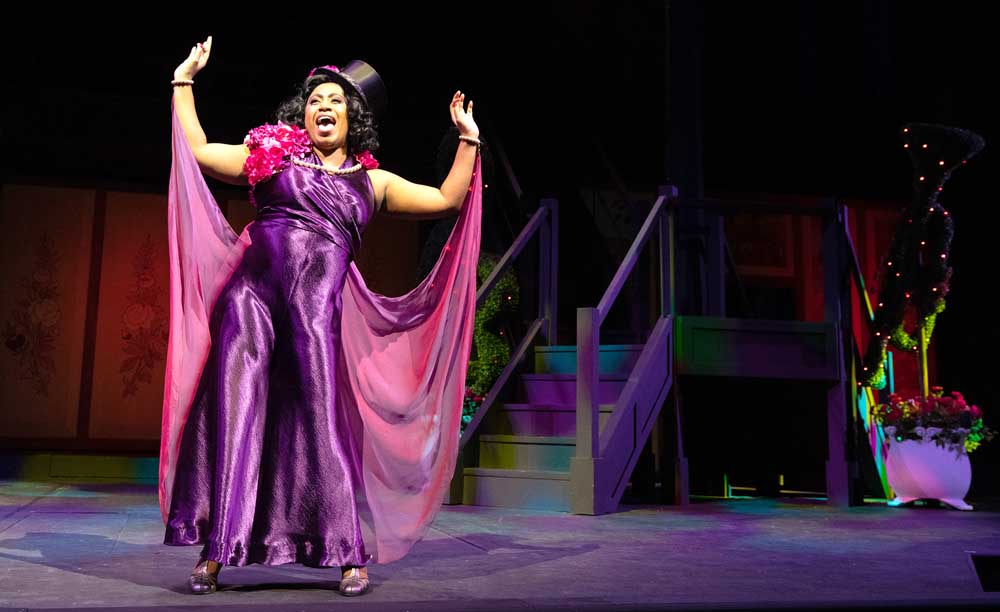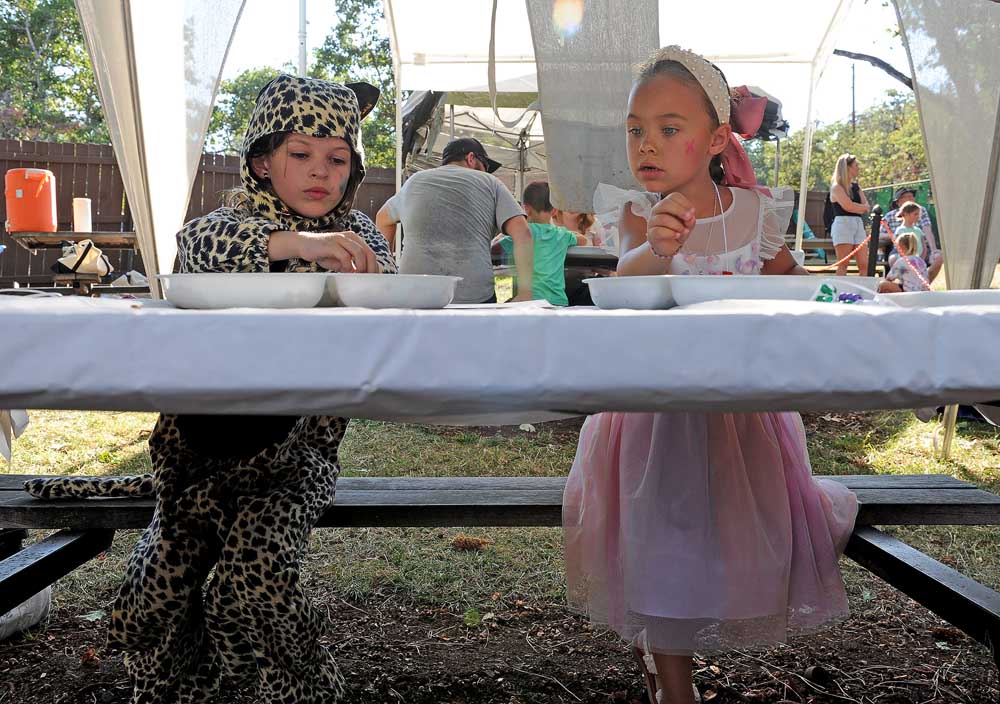Rogue Spotlight: Arielle Crosby sings the blues in OSF’s dazzling ‘Twelfth Night’
Published 5:45 am Tuesday, July 18, 2023

- Arielle Crosby as Feste the fool gives a torchy touch to her sung lines in Dawn Monique Williams' blues-inspired production of Shakespeare's "Twelfth Night," playing through Oct. 13 at OSF's Allen Elizabethan Theatre.
From a smoky corner of the dimly lit stage, she steps up to the mic, her presence commanding attention. Dressed in a silky purple gown that clings to her curves, she exudes a timeless elegance. As the spotlight illuminates her, she begins to sing a bluesy refrain, her voice a torrent of raw emotion, intertwining melancholy and strength.
Trending
Shakespeare’s Feste the fool may never have been so compelling.
Arielle Crosby plays the character in “Twelfth Night,” a production directed by Dawn Monique Williams, inspired by early blues and jazz greats such as Bessie Smith. It runs through Oct. 13 in the Oregon Shakespeare Festival’s Allen Elizabethan Theatre.
In her first season at OSF, Crosby was approached by Williams to audition for the role.
Trending
“I jumped at the possibility of being able to work with her again,” Crosby said.
It’s her first time acting in a repertory company.
“I’ve worked on two shows simultaneously before, but that was more a matter of schedules just overlapping,” she said. “I prefer working on more than one thing at a time, so it’s been quite a comfortable experience.”
She was surprised, initially, at being asked to audition for a role traditionally played as a male. But once Williams explained her vision for “Twelfth Night” and for Feste, Crosby was intrigued.
A singing fool
Feste has always sung in the play, but not usually so early as in the OSF production. The songs are romantic and mournful, helping to set the mood and atmosphere. The songs also allow Feste to stand apart as an observer of characters and events, providing commentary in a choric role.
The romantic comedy begins with the line, “If music be the food of love, play on.” And OSF’s 2023 “Twelfth Night” sings the blues.
Crosby believes it works very well for the story and characterizes her songs as a mixture of blues and torch.
“The show, while a comedy, deals with grief, loss and death, the stuff the blues are made of,” she said. “The story also deals with unrequited love, and that’s what torch songs are all about.”
She believes the choice of song style adds weight to the lines.
Not just ‘ditties’
“I think in traditional delivery, the sung lines are easier to dismiss as just some silly little ditties,” Crosby said. “The messages and foreshadowing can sometimes be disregarded or not fully absorbed.”
In this production, the form and modality of the music evoke feelings that are difficult to ignore, she said.
“Something about it is enticing.”
Crosby noted one scene in particular in which the singing style adds a unique layer of meaning, enhancing the audience’s experience.
“The Malvolio ‘prison’ scene is an interesting moment,” she explained. “Until that moment, we’ve seen Feste singing only in performance mode, even in the drunken garden scene, not as actual conversation.”
When she strips herself of the Sir Topas persona and returns to her own voice, she initially sings a more upbeat tune. But after conversing with Malvolio and reluctantly agreeing to help him, the tone turns somber.
“I think it really gives insight into the dynamic between Malvolio and Feste, and how interactions with him sour her disposition so much it even changes her musical delivery.”
Serving the text
She thinks the production strikes a balance between using the blues/torch singing style and staying true to Shakespeare’s original text and intentions.
“In our tablework and music sessions, I discovered the connections between the blues and Shakespearean verse,” she said, “and how one lends itself to the other. I don’t think any of the original text was sacrificed for any of the songs.”
Crosby identified with the character because of her own experience as a performer for hire.
“I also incorporated aspects I wish I possessed into Feste,” she said. “Not to say she doesn’t care, but she lets things roll off her back effortlessly and keeps pushing. I think her distaste and grudge against Malvolio may be one thing that came from me.”
Crosby, 33, was born and raised in Detroit and is based out of that city today. She grew up in a family of creatives — music on her dad’s side of the family, music and theater on her mom’s side.
“My father is an instrumentalist and singer,” she said, “and specializes in piano and keyboard. He’s currently a member of The Four Tops (Motown) band. My mother is also a singer who has been in several bands over the years.”
She remembers attending a performance of “The Wiz” when she was a kid. “My mom said I stood up the entire time. There was something about the energy, the lights, the dancing and the music that invigorated me.”
Debut at 11
She has been singing most of her life and entered a talent show at the age of 11. In high school, she participated in musicals and choral groups, winning first place in her division.
After earning a bachelor of arts degree in vocal performance from Kentucky State University, she participated in a concert tour in Spain and Portugal, performing gospel, musical theater, jazz and other genres.
Connection and creation give her the most satisfaction as a theater person.
“Connecting with my fellow actors on and off stage, with the creative team, and with the audience are probably the most fulfilling aspects,” she said.
What’s next for Crosby?
“It looks like I’ll be going back to Detroit and spend time with family and friends while doing a cabaret with the Detroit Public Theatre — and maybe a holiday gig. After that? Whatever else God brings my way.”
The many fans she is gaining as a cast member of OSF’s sparkling production of “Twelfth Night” are probably hoping she finds her way back to Ashland soon.
For more information about “Twelfth Night” and to purchase tickets, go to osfashland.org or call 800-219-8161.









